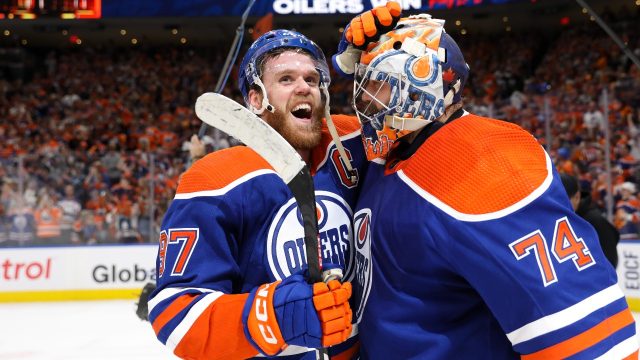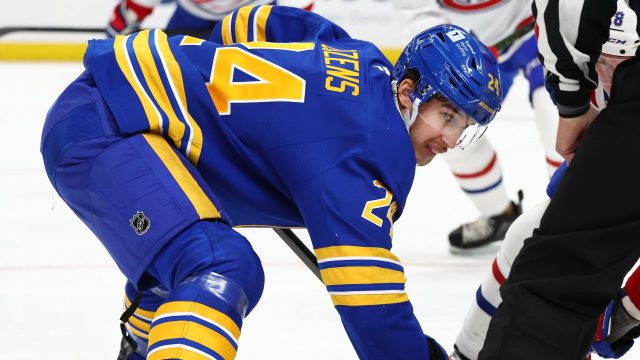
EDMONTON — Culture is, perhaps, hockey’s most divisive word.
It separates the folks who play in the National Hockey League from those of us on the outside who think we know a lot about playing in the National Hockey League — though we’ve never earned our way inside an NHL dressing room the way the players have.
“Culture,” we’ve heard people scoff. “I don’t want a guy who’s good in the room. I want a guy who’s good on the ice.”
The term divides the trade market, as teams avoid seemingly good players who quietly have been deemed to be “bad in the room,” while collecting players with lesser production and poorer analytics — because they are reputed to be “good in the room.”
It divides the NHL itself, as teams we thought were pretty good struggle with chemistry because they haven’t built a culture that can deal with adversity. Like, perhaps, the New York Rangers. Or at times, the Vancouver Canucks.
But the teams that have built an excellent culture, like Vegas, Boston and Tampa, are good no matter what new players arrive or who gets injured — because the emotional level of the team is affixed at a place where the ultimate goal of winning games is not affected by things like one under-performing player, some tough media, or a difficult road schedule.
-

-
NHL on Sportsnet
Livestream Hockey Night in Canada, Scotiabank Wednesday Night Hockey, the Oilers, Flames, Canucks, out-of-market matchups, the Stanley Cup Playoffs and the NHL Draft.
It took years and years to attain a proper, winning culture here in Edmonton. Years, before the leaders were in their mid-to-late 20s, the way Darnell Nurse, Connor McDavid, Leon Draisaitl and Ryan Nugent-Hopkins are today.
Now, older, character guys like Adam Henrique, Mattias Ekholm and Mattias Janmark want a piece of what’s going on here — and in doing so, make it a better place. A better culture.
Corey Perry is one of those long-toothed vets looking to win one more Cup before it’s over.
He’s been in some dressing rooms: A Stanley Cup room in Anaheim, with Chris Pronger, Teemu Selanne and Scott Niedermayer; Olympic dressing rooms, with as many as “Ten or 12 captains out of the 23 guys”; a World Junior Team Canada in North Dakota that is regarded as the best ever assembled.
“Let us in,” I said to him, as he sat in his dressing room stall Tuesday afternoon. “Tell the fans what it’s like in here when it’s only you players in here.”
“This is a great room,” Perry began. “If you had the opportunity to be in here before games, between periods, guys are always upbeat. It’s a brotherhood in here.
“There’s a little animosity sometimes, but that’s what keeps us on our toes. Guys keep each other accountable,” he said. “It’s a fun group, and when you’re here every day and you witness it — you’re part of it, you see it — it’s so good to be a part of it. Because not everybody has this.”
A proper culture starts with your best players. It has to.
That’s part of the reason the Rangers are a mess right now: Mika Zibanejad is minus-15 in 30 games and he’s the second highest-paid Ranger. Jacob Trouba, their captain, was alienated by management before the season even began.
Culture has a lot to do with what’s going in Vancouver, where they wonder every night if their highest-paid player — Elias Pettersson, at $11.6 million — is going to be “engaged.”
The players, they always know. They watch the video, they hear what the coaches are asking for, and they all realize who among them is fully committed and who is less so.
And if you’re wearing a letter, sitting atop the pay scale, or exhorting others to pick up their game, you’d better be doing it yourself.
In an NHL dressing room, you can’t ask anyone to follow if you don’t carry yourself as a leader.
“If those guys are doing it, everybody else is going to follow,” said Perry, who has gone from first-line Alpha dog to fourth-line support guy over his 1,342 NHL games. “Guys don’t want to be the ones being yelled at by the leaders — by the top guys — because they’re not doing the right things. And the top guys have to (be examples). It’s a trickle-down.”
Canucks coach Rick Tocchet referred to the Oilers earlier this week when he said, “We don’t have the team to have three, or four, or five passengers. Edmonton, they can have four or five guys sleeping. They have guys who can win the game for them.”
Are Edmonton’s Top 2 players better than the Canucks’? Sure — but that’s not the point.
The point is that Edmonton’s top players don’t have “engagement” issues.
They don’t play great for 82 games. No one does. But they do the right things for 82 games. They set the right example for 82 games, so guys who are further down the roster either follow behind, or have to answer for their game when the leader calls them out.
“Nobody wants that. And that’s why those guys are leaders,” Perry explains. “Because if they do see it, you’re going to get called out. That’s why this room is tight, because we have that ability to be able to tell somebody, ‘Do your job. Pick it up. Block that shot,’ or whatever.”
-

-
The Fan Hockey Show
Sportsnet’s Matt Marchese and former Los Angeles Kings executive Mike Futa take you around the league on Sportsnet 590 The FAN’s national hockey show, airing live across the country daily from noon-2 p.m. ET.
You think Perry is done?
At age 39 he’s got six even-strength goals this season. That’s fourth on the Oilers, two more than Pettersson and Zibanejad, and one more than Mitch Marner. He’d be tied for the lead on his old team, the Anaheim Ducks.
As for the ultimate leader in Edmonton, Connor McDavid, what we always hear about the team captain is this: When you see McDavid constantly trying to improve his game, how can you not be trying to improve yours?
That’s culture. It starts at the top, or it doesn’t start at all.
“If it’s coming from the top guys — your leaders — that’s why they’re wearing the letters,” Perry said. “It runs through the team.
“You’d better follow suit.”






